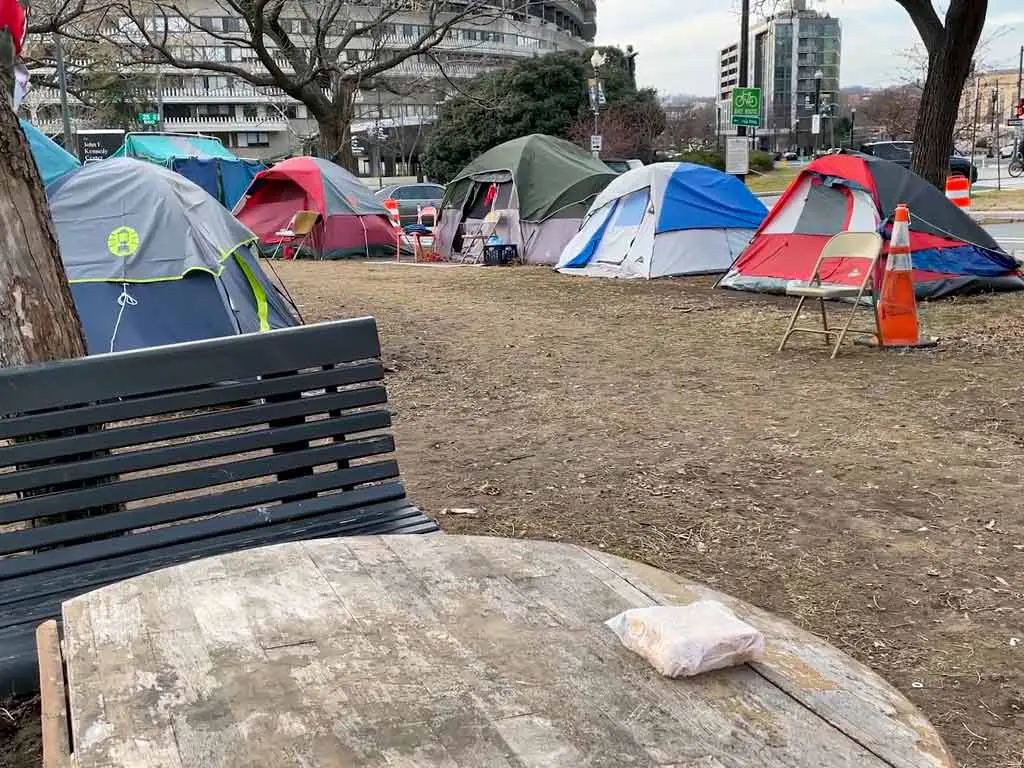In Washington, DC, the issue of homelessness remains a pressing concern that continues to capture public attention.
The sight of individuals living on the streets has become a stark reality in the nation’s capital, prompting many to question the underlying causes behind this pervasive problem.
Despite various initiatives and programs aimed at addressing homelessness, the numbers persist, raising the important question: why are there so many homeless individuals in Washington, DC?
To understand the complexities of this issue, one must delve into a myriad of factors that contribute to homelessness in the city. From economic disparities and lack of affordable housing to mental health challenges and systemic barriers, the reasons are multifaceted.
By exploring the root causes of homelessness in Washington, DC, we can gain valuable insights into how to effectively combat this issue and work towards creating a more inclusive and supportive community for all residents.

Exploring the High Rates of Homelessness in Washington D.C.
In Washington, D.C., the high rates of homelessness are significantly influenced by the impact of housing affordability and the role of racial disparities in the city.
Impact of Housing Affordability
Housing affordability plays a critical role in the high rates of homelessness in Washington, D.C. The city faces significant challenges in providing affordable housing options, contributing to the increasing number of individuals experiencing homelessness.
With skyrocketing rents and a shortage of affordable housing units, many residents are forced to live on the streets or in shelters, exacerbating the homelessness crisis.
Role of Racial Disparities
Racial disparities also contribute to the prevalence of homelessness in Washington, D.C. Communities of color are disproportionately affected by homelessness due to various systemic factors, including historical injustices, discrimination, and unequal access to resources.
The intersection of race and homelessness highlights the need for targeted solutions that address the unique challenges faced by marginalized communities in the city.
Factors Contributing to Homelessness in Washington DC
In Washington DC, several factors contribute to the homelessness crisis. Economic inequality, health issues, and housing affordability are among the primary reasons behind this growing issue.
Economic Inequality and Unemployment

Economic inequality and unemployment significantly influence homelessness in Washington DC. The income gap has widened, leaving low-income individuals unable to afford basic necessities.
According to the U.S. Census Bureau, the median household income in the city is $92,266, while 13.5% of residents live below the poverty line. Job loss and lack of employment opportunities worsen the situation, particularly for unskilled workers.
Impact of Health Issues and Disabilities
Health issues and disabilities also play a crucial role. Many individuals lack access to adequate healthcare, leading to untreated chronic illnesses.
The Substance Abuse and Mental Health Services Administration (SAMHSA) reports that approximately 20-25% of the homeless population in the U.S. suffers from severe mental illness.
Disabilities further impede the ability to secure stable housing, as special accommodations and support services are often insufficient.
Influence of Housing Affordability and Evictions
Housing affordability and evictions are critical issues in Washington DC. The National Low Income Housing Coalition highlights that the city has one of the highest rental costs in the nation.
For instance, the fair market rent for a two-bedroom apartment is $1,785 per month. Rising rents and stagnant wages lead to financial strain. Evictions have also increased, with over 30 evictions filed per day, affecting the stability of vulnerable households.
Social and Racial Justice Issues in Homelessness
Social and racial justice issues play a critical role in Washington D.C.’s homelessness crisis. Examining these factors helps you understand how they exacerbate the issue.
Systemic Racism and Housing Discrimination

Systemic racism and housing discrimination significantly contribute to homelessness in Washington D.C. Historical policies like redlining and discriminatory lending practices have marginalized Black and other minority communities.
According to the National Low Income Housing Coalition, these groups face disproportionate barriers to affordable housing. Furthermore, a report from the Urban Institute shows that eviction rates are notably higher among Black renters, deepening the crisis.
Addressing these systemic issues is essential for reducing homelessness and promoting equity in the housing sector.
Homelessness Among Different Demographics
Homelessness affects different demographics in unique ways. In Washington D.C., data from the U.S. Department of Housing and Urban Development reveals that nearly 86% of the homeless population identifies as Black, highlighting racial disparities.
Families with children make up a substantial segment, with over 1,200 family units reported homeless in the 2022 Point-in-Time count. Youth and LGBTQ+ individuals also face significant vulnerabilities, often stemming from family rejection or societal stigma.
Addressing the specific needs of these groups can help create more effective support systems and reduce overall homelessness in the city.
Government Responses and Initiatives
Addressing homelessness in Washington D.C. involves various government responses and initiatives.
Role of Permanent Supportive Housing
Permanent Supportive Housing (PSH) combines affordable housing with support services, targeting chronically homeless individuals. D.C. invested significantly in PSH, reducing homelessness among vulnerable populations.
This approach stabilizes lives by providing both housing and essential resources like healthcare and employment assistance, fostering long-term independence.
Effectiveness of Local Homelessness Programs
Local programs like the Homeless Prevention Program and Rapid Re-Housing serve critical roles in reducing homelessness. The Homeless Prevention Program offers short-term assistance for those at risk of losing their homes.
Rapid Re-Housing focuses on quickly moving individuals and families into stable housing. These programs, when funded and managed effectively, lower homelessness rates by offering tailored solutions aimed at specific needs and challenges in the community.
Government responses and initiatives designed to tackle homelessness in D.C. are crucial in mitigating the crisis and fostering a more equitable society.
The Impact of Recent Crises on Homelessness

Recent crises have exacerbated homelessness in Washington D.C., adding layers of complexity to an already critical situation.
COVID-19 Pandemic and Economic Recession
The COVID-19 pandemic worsened homelessness. More people faced job losses and financial instability as businesses shuttered and lockdowns persisted.
Retail and hospitality sectors saw up to 30% job losses, according to the Bureau of Labor Statistics. Public health measures restricted shelter capacity, forcing many onto the streets. Eviction moratoriums helped temporarily but delayed the inevitable surge in homelessness once lifted.
Housing Crisis Predictions and Reality
Housing crisis predictions underestimated the rapid increase in homelessness. Experts predicted that without sufficient interventions, homelessness would rise significantly.
As housing prices soared by over 11% annually (Zillow, 2022), affordable options dwindled. Predictions showcased that market demands would outstrip supply, leaving more people without homes.
In reality, the predictions materialized; record-high evictions and crowded shelters reflect the stark housing inequities in the district.
Community and Policy Recommendations
Community involvement and policy changes play crucial roles in addressing homelessness in Washington D.C.
Importance of Community Involvement
Engaging community members helps build a cohesive response to homelessness. Local organizations, residents, and businesses can collaborate to provide critical resources.
Volunteering at shelters, donating supplies, and advocating for affordable housing policies amplifies efforts by government and non-profits.
Community-driven initiatives such as neighborhood watch programs and food drives offer directly impactful support to those in need.
Increase Affordable Housing
Expanding affordable housing projects reduces housing insecurity. Funding low-income housing tax credits and incentivizing private developers to include affordable units help address shortages.
Enhance Support Services
Providing comprehensive support services addresses the multifaceted needs of homeless individuals. Offering medical care, mental health services, job training, and substance abuse programs facilitates stability and self-sufficiency.
Strengthen Housing First Initiatives
Strengthening Housing First initiatives ensures stable housing for homeless individuals without pre-conditions. Evidence supports that stable housing leads to better outcomes and reduces long-term costs.
Expand Permanent Supportive Housing (PSH)
Increasing PSH programs integrates affordable housing with support services to help vulnerable populations. Consistent support in housing helps prevent cycles of homelessness.
Promote Policy Reforms
Implementing policy reforms, such as rent control and eviction moratoriums, protects renters from displacement. Advocating for changes at the municipal and federal levels addresses systemic barriers to affordable housing.
Addressing community involvement and implementing targeted strategies are essential for mitigating homelessness in Washington D.C.
Frequently Asked Questions
Why is homelessness a significant issue in Washington, DC?
Homelessness in Washington, DC is a significant issue due to rising rent costs outpacing income growth for low-income individuals, contributing to housing instability and homelessness.
What initiatives have been successful in reducing chronic homelessness in DC?
Initiatives like permanent supportive housing and community programs have shown success in reducing chronic homelessness in Washington, DC.
How can policymakers and stakeholders address homelessness in DC effectively?
Policymakers and stakeholders can address homelessness effectively by implementing tailored affordable housing programs, enhancing mental health support systems, and fostering collaborative efforts among government agencies, non-profits, and the private sector.
What are the key factors contributing to homelessness in Washington, DC?
Key factors contributing to homelessness in Washington, DC include economic challenges, health issues, lack of support systems, housing affordability issues, and racial disparities.
What is the importance of holistic approaches in tackling homelessness in DC?
Holistic approaches are crucial in addressing homelessness in Washington, DC as they target the root causes of homelessness and aim to build a more inclusive and supportive environment for all residents through coordinated prevention and intervention efforts.
Conclusion
The discussion around homelessness in Washington, DC reveals a complex interplay of factors contributing to the high numbers of individuals living without stable housing.
From economic challenges to inadequate healthcare services and social support systems, the issue of homelessness is multifaceted and deeply rooted in societal structures.
While there have been notable successes in initiatives such as permanent supportive housing and community programs, there is a lingering need for more holistic approaches that address the root causes of homelessness.
Moving forward, policymakers and stakeholders must prioritize tailored affordable housing programs, bolster mental health support systems, and foster collaboration among diverse entities to generate sustainable solutions.
By investing in comprehensive strategies that address the underlying issues fueling homelessness, Washington, DC can work towards creating a more inclusive and supportive environment for all its residents.
The road to combatting homelessness requires a collective effort that transcends individual programs and embraces a coordinated approach to prevention and intervention.




Allison Brice